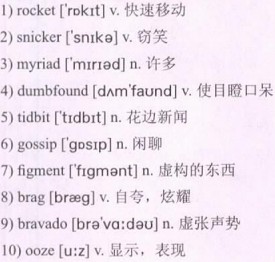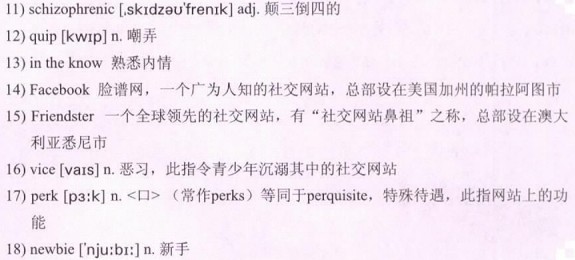文字难度:★★☆
 开心网的出现用另一种方式实现了不少人的“田园”梦想,也为不少人找回了不少“旧相识”,当然,肯定也浪费了不少人不少的时间。瞅瞅那些终日紧张兮兮守在菜地、牧场、鱼塘边收东西、“偷”东西的新手,作为老手的你忆起自己往昔的“峥嵘岁月”,是不是也不禁苦笑了一番?
开心网的出现用另一种方式实现了不少人的“田园”梦想,也为不少人找回了不少“旧相识”,当然,肯定也浪费了不少人不少的时间。瞅瞅那些终日紧张兮兮守在菜地、牧场、鱼塘边收东西、“偷”东西的新手,作为老手的你忆起自己往昔的“峥嵘岁月”,是不是也不禁苦笑了一番?
如今,各类社交网站层出不穷,给人们提供了另一种迥异于书信、邮件的“联络”方式。选择是多了,但如何用好手中的工具才是最重要的。
衷心祝愿本文的作者,俺们的一个外国朋友,能从中找到和中国同事更惬意相处的好方式。 ——Lavender
Over lunch with my Chinese colleagues, conversation tends to 1)rocket across the table, sparking giggles of excitement and 2)snickers of distaste. The 3)myriad names of Chinese celebrities speed beyond recognition to the untrained ear. As if lunchtime small talk were not challenging enough, I recently discovered that some of the most 4)dumbfounding 5)tidbits of office 6)gossip are actually 7)figments of an imaginary world otherwise know as Kaixinwang or “Happy Net.”
和我那些中国同事一块吃午饭时,我们的谈话往往在饭桌上快速推进,引发一阵阵或出于兴奋的哈哈大笑,或出于厌恶的窃笑。数不清的中国名人的名字在大家口中飞速而过,没经过长期训练还真来不及反应是在说谁。午餐闲聊对我来说已经够具挑战性的了,更让我迷惑的是,最近我发现办公室里最“骇人”的一些八卦消息其实是源自一个名为“开心网”的虚拟世界。
“So I sold my house in Hangzhou and I made 2 million yuan!” one of my colleagues 8)bragged.
“Why buy a house in Hangzhou when you can buy a luxury villa in Shanghai?” another offered with 9)bravado.
“Hangzhou is so romantic,” another 10)oozed.
“Ha-ha, I noticed you are broke. You can be my slave, that should help you make some money!”
“Did you notice that I helped you water your garden this morning? Now your roses are growing beautifully!”
“我卖了在杭州的那套房子,赚了200万!”我的一个同事炫耀道。
“都可以在上海买一套豪华别墅了,干嘛在杭州买房子呢?”另一个同事一副财大气粗的样子提议道。
“杭州浪漫呀。”又一个人发表意见道。
“哈哈,我看到你一分钱都没了。来做我的奴隶吧,这样就可以赚点钱了!”
“你有没留意到我今天早上给你的花园浇水了?现在你的玫瑰长得可漂亮了!”
This 11)schizophrenic conversation was an acute departure from the daily dissection of celebrities and regular 12)quips about working girl hardships. I frantically posed a flurry of questions.
相比往日那些名人八卦和有关上班女郎艰苦境况的嬉笑怒骂,这番颠三倒四的对话明显是个新鲜话题。我不禁狂问了一堆问题。
“Isn’t it expensive to buy a house in Hangzhou? What do you mean she can be your slave? How come you never mentioned you had a rose garden?” Laughter erupted around me. “It’s not for real! It’s just Kaixinwang!” This was just one of many “Happy Net” interchanges that left me dazed and confused.
“在杭州买套房子不是很贵吗?她去做你的奴隶,这是什么意思?我怎么从来没听你提过你有个玫瑰园?”我周围爆发出一片笑声。“不是真的!在玩开心网而已!”这只是众多有关“开心网”的讨论中让我困惑的一次。
If you’re not 13)in the know, Happy Net is a Chinese social networking website. In the tradition of 14)Facebook, 15)Friendster and other wildly popular Internet 16)vices, it is a network that allows you to track down and peer into the profiles of friends and colleagues, even those you have not seen or heard from since primary school. Juicy details like age, marital status and profession are freely broadcasted, not to mention the endless streams of photos, public comments and message posts.
如果你不明就里,我来说说。开心网是中国的一个社交网站。它秉承了Facebook、Friendster和其他一些令青少年沉溺其中的火爆的社交网站的传统,你能在上面追踪以及查看朋友和同事,甚至是那些你打小学毕业以后就没见过或再来往通信的朋友的资料。像年龄、婚姻状况和职业这些隐私详情都随意公布在上面,更别提那些源源不断发布出来的照片、公开评论和信息留言。
In addition to the regular 17)perks of online networking, Happy Net offers users an alternate reality that adolescent boys pour over in 24 hour Internet bars. In a more direct flirtation with fantasy, Happy Net games echo the economic possibilities of real life. You may start as an asset-less Happy Net 18)newbie, but opportunities abound for you to make your way up the online, economic food chain. As a newcomer you can earn money auctioning yourself off and laboring as a slave; you can earn your freedom, purchase land, and raise plants and vegetables that you can then sell to generate profit. After this, your options expand. You can play the real estate market and refurbish your new, luxurious home.
除了有在线社交网站通常都具备的一些功能,开心网还向用户提供了另一种虚拟的“真实”,而这种“真实”诱使十几岁的男孩们通宵达旦泡在网吧里。开心网上的游戏模拟真实生活中的经济商机,使用户更直接地与幻想世界对碰玩乐。在开心网里,你一开始可能只是没什么资产的新手,但是网上随处都是让你得以沿着虚拟的“经济食物链”往上攀爬的机会。作为一个新手,你可以把自己卖给别人做奴隶干活来赚钱;你可以赎身、买地、种花、种菜,然后卖掉收成来赚钱。这以后,你的选择余地会扩大。你可以投身到房地产市场,还可以装修你的豪华新房。
It is like wrestling with real life in a cartoon playground, devoid of risks and loss, and it costs nothing to play, except for endless hours of wasted time in the office.
这一切就好像在一个卡通的世界里过真实生活一般,除了在办公室里耗掉那数不清的时数以外,没有风险,没有损失,并且不花一分钱。
Before I discovered the existence of Happy Net, I imagined working in China, and interacting with my Chinese colleagues to be fairly delicate terrain. Countless publications on doing business in China dictate the importance of 19)garnering guanxi (connections), learning to respect and save “face”, and inviting your business partners to20)fancy seafood banquets. Many of us 21)flounder, navigating the complex array of social relationships, trying to 22)decipher the real meaning behind “polite” negotiations, and managing the preconception that foreigners make 23)oodles more cash than their Chinese colleagues.
在我发现开心网的存在以前,我想象着在中国工作以及和中国同事互动会相当棘手。无数教人怎样在中国做生意的出版物都指出,得建立关系网、学会尊重他人、给他人留“面子”、谈生意得请对方吃奢华的海鲜宴,并把这些方面说得何其重要。于是,我们这些外国人很多都会在复杂的社会关系网中挣扎前行,试图弄明白“礼貌的”谈判其个中的真正意味,还得应对“外国人比他们的中国同事赚的钱多得多”这种偏见。
My discovery of Happy Net has forced me to question whether my colleagues are really so different. Is Chinese corporate culture really so complicated and unfamiliar? At the end of the day, when I log on to Facebook through a 24)VPN, anxious to see who has got married, who has got fat since they had three kids, and who has shed their teenage awkwardness, I realize that I already have my own Happy Net.
发现了开心网迫使我提出了这样一个问题:我的中国同事是不是真的那么不一般?中国的团队合作文化真的那么复杂那么陌生吗?那天晚上,我通过远程代理网站登陆Facebook,焦急地想知道谁结婚了,谁生了三个孩子后变胖了,谁已脱胎换骨不再青涩,这时,我意识到我已经拥有了自己的“开心网”。
With one foot in each continent, the screen separates fantasy from reality, and I realize that my Chinese colleagues and I are not so different after all.
现实和虚幻两片天地仅一步之遥,而显示屏就这样把它们分离开了。我也意识到,我的中国同事们和我也并非如此不同。




